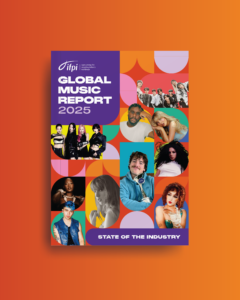Today, Music Canada CEO Patrick Rogers shared his annual “State of the Industry” remarks at Departure, followed by an informed discussion about the political shifts that are affecting the global music industry.
Read his full remarks below.
Good morning,
It is great to be here at Departure.
I want to thank Randy Lennox, Jackie Dean and Kevin Barton for making this opening time slot available to Music Canada and our annual State of the Industry update. I’d also like to take a moment to congratulate CMW founder Neill Dixon on his lifetime achievement award. Neill was an important ally to Music Canada for decades and understood the importance of us coming together in the daylight and not just in venues.
Each year, CMW was always a time that we could cover all the most important issues of the day not just for our members but the Canadian industry as a whole and we are thrilled that Departure has given us the opportunity to do the same here, in a new setting, with a new vibe, with artists and their creations at the centre of the programming.
And it makes sense to have a new, refreshed conference and festival because the industry has changed. Even for an industry that is always innovating, the industry has transformed fundamentally in the last ten years and the acceleration of that progress appears to be speeding up all the time.
All of that to say, me and the team at Music Canada as well as Canada’s major labels, are excited about this week. We are excited about who you will hear from, and we are thrilled that Departure stands to be the premiere music conference in the country.
Today, I’m going to start with saying a couple of words about the biggest challenges and opportunities facing the global music industry and Canada’s place in it. In a moment I will sit down with journalist Hannah Sung to talk about how the results of last week’s federal election impact those items.
Tomorrow, Beatdapp’s Founder and Co-CEO Morgan Hayduk and I will talk about the Rules and Tools of AI. We are going to dive into some of the biggest headlines, and talk about what it all means for the music industry.
And importantly, throughout the week, members of Canada’s major labels and artists will be on panels and at the festival throughout the city.
But let me get back to why I think Departure is important for the Canadian music industry.
It matters because the world continues to spin faster and faster and there is so much news. Our instinct to look away threatens to beat the instinct to lean in. But the answer is to check in on one another. Say what we think is important. And update each other on the things that we’ve said before.
So let me update you on two things that I talked about last year.
I’m going to start with the one I got right.
Last year, I talked about AI. My journey with AI went from holding out the belief that maybe it really was a giant machine brain listening to music just like Harrison and Hendrix and coming up with its own music.
To fully realizing that the reason that generative AI models kept producing rip offs of the world’s most famous music was because the AI was ripping off the world’s most famous music.
I should have known. Because, the biggest academic and legal proponents of AI-being-allowed-to-steal-everything, are literally the same academic and legal proponents that once argued the Internet-should-be-able-to-steal-everything not that long ago.
Well, here we are a year later and… the line from AI companies- companies that have already scraped the internet – scraped your music – to train their models – is that copyright is old and complicated and a barrier to innovation. That it’s too hard to track down the rightsholders, and it’s way too difficult to track what’s ingested, or even think about putting a price on it.
I for one am glad that they’ve given up on the giant machine brain stuff. I found it difficult to wrestle with. I worried that policymakers would look to AI companies as tomorrow – a new frontier of science and innovation, flying cars and the Jetsons. And that in turn cultural industries would be seen as yesterday, golden oldies and the Flintstones.
But under the pressure of court cases and public scrutiny they have chosen to fight on – copyright. And copyright is an issue the music industry is especially well fit to fight. Because we just did this. After years of tough decisions around the streaming economy, the industry is now more technologically prepared to deal with the licensing of AI than any other cultural industry in the world.
The global music industry, driven by streaming, is innovation at its peak. We have invested in the people, the infrastructure and the tech that can distribute and license more than 100,000 new tracks a day, crediting and compensating all of the many rightsholders along the way.
One of the claims that AI-should-be-able-to-steal-everything proponents like to say, is that they need text and data mining exceptions because most of what they are ingesting has no value.
That argument may or may not make sense when it comes to medical data sets or traffic patterns – but it makes no sense in music. We put a price on music all of the time and basically since the inception of iTunes and now streaming, consumers have been happily paying for it. AI must not be different.
Do not be fooled. Copyright is how artists are paid when their music is played. To complain about copyright in this business is like the student who doesn’t want to learn spelling or math – and I know that those very people will say that they have AI for that – but we are all better when we understand the fundamentals of our world, and our industry.
And I say this to you as AI proponents are lined up at the doors of our new government (as they are around the world) with promises of investments, productivity and jobs if we just get rid of copyright law. We must arm the government with why that would be a mistake and the harm that it would do. Curing cancer, mapping the galaxies and improving crop yields don’t require stealing your music.
As I said, tomorrow, Morgan Hayduk and I are going to talk more about the opportunities that AI presents the industry – the tools – and the rules that are required to make them possible. But if you can’t make that, let me leave you with this:
If you want to protect creators, their art, and the human creative process as we have known it since Michaelangelo – you have to fight to protect copyright.
Ok, now to discuss something that I got wrong last year.
If it’s ok with you, I’m going to ease into this a bit and set the context. The first thing that I want to let you know is that the time I spent working in politics left me believing in politics and government. I know, because I have first hand experience of the good that good policy can do. That careful consideration by smart people can lead to important change.
So from the very beginning, I have been hopeful about the once in a generation regulatory process that the CRTC has undertaken following the passage of C-11. And last year, I gave a speech about how the CRTC should turn over every stone, and build a new system for the new digital global economy and I gently warned that we couldn’t regulate streaming with radio rules.
… And it only took about 22 hours after my speech for the CRTC to release their Phase 1 decision which could be called “bringing the foreign streamers into the Canadian broadcasting system” but could also be thought of as “regulating streaming services like Canadian radio stations”.
I cannot hide my frustration about this. Part of the frustration comes from understanding how we got here. I get that the parts of the industry that rely on government funding have seen traditional funding drying up for more than a decade in both film and television as well as music. Contributions to funding programs based on market consolidation have come to an end over the lack of consolidation. Funding based on levies on cable bills have evaporated over cord-cutting. Government funding directed to arts and culture has not met demand, even after ten years of traditionally friendly government. And now, especially now, the idea that massive foreign services should have to pay for Canadian content is a policy tempting to sell.
But let me be clear: the best cultural policy in Canada is one that incentivizes global digital platforms to invest in Canada. To have Canadians on the ground, working with Canadian artists, Canadian labels and publishers and Canadian festivals, venues and celebrations.
We should want Canadian employees, Canadian artist plans, Canadian splash pages and Canadian sponsorship.
But so far, the desire for foreign cash has won out. Phase 1 of the CRTC process did not recognize the contributions to the Canadian industry that platforms are already making.
This is a mistake. It will lead to less investment in Canada and will eventually, to the disappointment of all, leave us looking for more money sooner than later.
Two weeks ago, we filed a motion to intervene at the Federal Court of Appeal on the case brought forward by the platforms. Our specific approach will echo what we have said from the beginning: that the investments made by the platforms in Canada must be understood and valued by the regulator as part of the contribution system. We have been leading stakeholders in parliament and at the CRTC. It only makes sense that we should share the views of the commercial music industry with the court.
We will also be contributing the rest of the year to the formal CRTC consultations. Our goal continues to be to help the CRTC build the best regulatory framework for the streaming era so that Canadian and Indigenous artists can compete with every song ever recorded from everywhere in the world.
I am still hopeful. But hope is not a plan. We will be working hard on this file. Canada deserves a regulatory system as globally inspired as our artists.
I’m already looking forward to coming back next year to tell you how we did.
Now, we had an election last week. We’ve got a lot to talk about. To do so, I’m going to speak with journalist Hannah Sung. You first knew her as a MuchMusic VJ, she now writes on culture for outlets like the Globe and Mail, Toronto Star and the New York Times. She’s the co-founder of Media Girlfriends, a company that prioritizes inclusion in Canadian media. Asking her to join me seemed very on brand for what Departure is to become.
Please welcome Hannah Sung.

 In honour of the 50th anniversary of Music Canada’s Gold & Platinum Certification Program, we have teamed up with the JUNOS to create a truly unique ode to the albums and songs Canadians have loved most over the past five decades.
In honour of the 50th anniversary of Music Canada’s Gold & Platinum Certification Program, we have teamed up with the JUNOS to create a truly unique ode to the albums and songs Canadians have loved most over the past five decades.



Music Canada